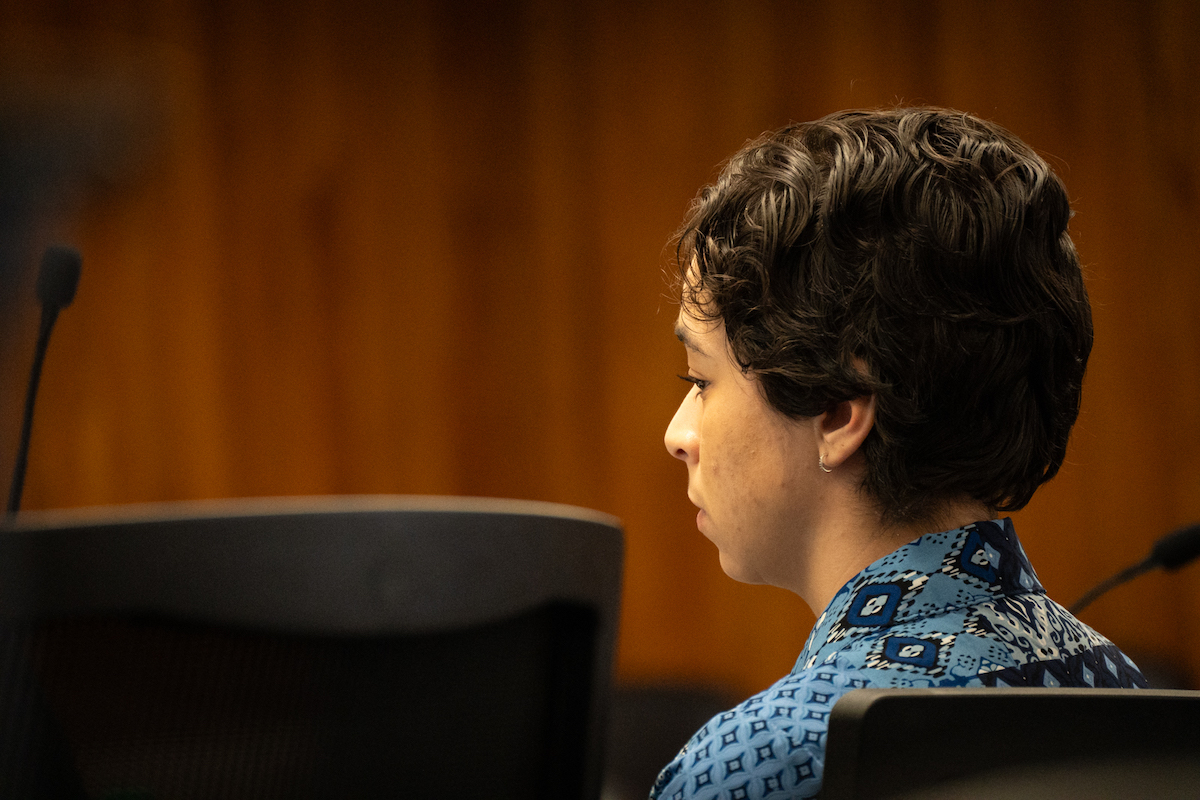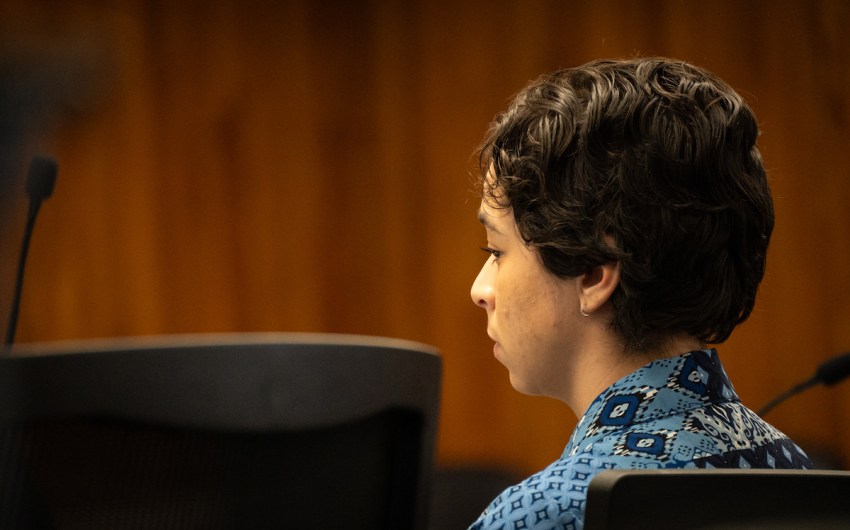After Difficult and Emotional Trial, Cora Vides Is Convicted of Attempted Murder
Jury Will Now Decide If Former Laguna Blanca Student Is Sent to State Prison or Psych Hospital

Nearly four years after she stabbed and strangled her friend in a vicious attack at her family home on the Mesa, Cora Vides was found Monday guilty of first-degree attempted murder.
Vides, 21, had been out of custody since shortly after the 2021 assault ― her father, a Microsoft finance executive, had posted her $1 million bail ― but once the verdict was read, she was immediately placed in handcuffs and led to a holding cell in the basement of the Santa Barbara County Courthouse.
The jury deliberated for five full days before rendering their unanimous decision. The month-long trial was “incredibly difficult,” acknowledged Judge Von Deroian, and generated considerable public attention.
The verdict elicited quiet sobs from friends and family of the victim, Georgia Avery, and loud wails from Vides, whose parents were present in the audience. Vides’s mother fidgeted and stared at members of the jury while her father, who had given Vides the switchblade she used to repeatedly stab Avery, sat motionless.
After the hearing, Avery’s mother sent an email to supporters expressing her family’s gratitude for the long-awaited decision. “Thank you to this jury for taking the time to come to the truth and give our sweet Georgia some peace,” she wrote.
Avery, who is now in college but struggles with post-traumatic stress disorder, testified during the trial with the aid of a service dog. The scar she received from a gaping knife wound to her neck remains visible.
Vides and Avery were both 18 years old at the time of the attack and seniors at Laguna Blanca School. Vides had transferred to the private Hope Ranch school after her family moved from Washington state to Santa Barbara, where she had difficulty fitting in and making friends. The pair met in art class and bonded over music and film.
Prosecutors Kevin Weichbrod and Sarah Barkley argued Vides developed a plan to kill Avery after she became romantically “fixated” on her friend but knew Avery did not share the same feelings. Vides had previously expressed interest in two of her childhood friends from Washington but was rebuffed both times.
The night of the stabbing ― approximately 2 a.m. on Valentine’s Day ― Vides and Avery were talking about the stresses of college applications and their hopes for the future when Vides suggested Avery try a new meditation technique she’d learned. Vides directed Avery to lie on the ground, cover her eyes, and think positive thoughts.
As she tapped on Avery’s forehead and counted down from three, Vides took hold of the knife and plunged it directly through the centerline of Avery’s throat, missing her carotid arteries by millimeters. When Avery fought back, Vides kept stabbing at her friend before attempting to strangle her in a chokehold and smother her with a blanket.
After a prolonged struggle, Avery was able to convince Vides to stop her assault and wake her parents, who then rushed Avery to Cottage Hospital. She underwent emergency surgery and was transferred to UCLA Medical Center, where she endured several more surgeries and a lengthy recovery.
Vides later told detectives that, in the days leading up to the attack, a “bad thing” that wanted Avery “gone” had taken hold of her thoughts and directed her violent actions. A psychiatrist hired by Vides’s defense team testified Vides suffered from an “unspecified dissociative disorder” at the time and had experienced a psychotic break.
The psychiatrist’s diagnosis ― in which he also cited acute depression, social anxiety disorder, avoidant personality disorder, and gender dysphoria as co-occurring factors ― conflicted with those of three other mental health professionals, who said they found no evidence of a dissociation or psychosis in their assessments of Vides.
Vides’s defense attorney, Robert Sanger, did not respond to requests for comment.
Now that Vides has been found guilty of attempted murder, a second phase of the trial will begin Thursday to determine if she was legally sane at the time of the attack. In other words, if she knew the “nature and quality” of her actions were “morally and legally” wrong.
She is presumed sane, and the burden is on the defense to prove otherwise.
If the jury finds Vides was sane, she will be sentenced to 11 years to life in prison, meaning she will only be eligible for parole after serving 11 years behind bars.
If she is found insane, she will be sent to a psychiatric hospital, where doctors will decide how long she is committed. Her length of stay could range from six months ― the minimum assessment period ― to much longer, depending on the outcome of her treatment.
Premier Events
Thu, Nov 28
12:00 PM
Santa Barbara
Thanksgiving Dinner at The Harbor Restaurant
Fri, Nov 22
11:00 AM
Santa Barbara
Santa Barbara Antique & Vintage Show & Sale
Fri, Nov 22
6:00 PM
Santa Barbara
Introduction to Crochet Workshop
Fri, Nov 22
7:30 PM
Carpinteria
Rod Stewart VS. Rolling Stones Tribute Show
Fri, Nov 22
9:00 PM
Santa Barbara
Numbskull Presents: Jakob’s Castle
Sat, Nov 23
11:00 AM
Santa Barbara
Santa Barbara Antique & Vintage Show & Sale
Sat, Nov 23
12:00 PM
Santa Barbara
Fall 2024 Healing Arts Faire
Sat, Nov 23
7:30 PM
Santa Barbara
SBCC Theatre Arts Department presents “Mrs. Bob Cratchit’s Wild Christmas Binge”
Sun, Nov 24
11:00 AM
Santa Barbara
Santa Barbara Antique & Vintage Show & Sale
Sun, Nov 24
6:00 PM
Santa Barbara
¡Viva el Arte de Santa Bárbara! Mariachi Garibaldi de Jaime Cuellar
Sun, Dec 01
5:00 PM
Santa Barbara
Paseo Nuevo Tree Lighting Ceremony
Thu, Nov 28 12:00 PM
Santa Barbara
Thanksgiving Dinner at The Harbor Restaurant
Fri, Nov 22 11:00 AM
Santa Barbara
Santa Barbara Antique & Vintage Show & Sale
Fri, Nov 22 6:00 PM
Santa Barbara
Introduction to Crochet Workshop
Fri, Nov 22 7:30 PM
Carpinteria
Rod Stewart VS. Rolling Stones Tribute Show
Fri, Nov 22 9:00 PM
Santa Barbara
Numbskull Presents: Jakob’s Castle
Sat, Nov 23 11:00 AM
Santa Barbara
Santa Barbara Antique & Vintage Show & Sale
Sat, Nov 23 12:00 PM
Santa Barbara
Fall 2024 Healing Arts Faire
Sat, Nov 23 7:30 PM
Santa Barbara
SBCC Theatre Arts Department presents “Mrs. Bob Cratchit’s Wild Christmas Binge”
Sun, Nov 24 11:00 AM
Santa Barbara
Santa Barbara Antique & Vintage Show & Sale
Sun, Nov 24 6:00 PM
Santa Barbara
¡Viva el Arte de Santa Bárbara! Mariachi Garibaldi de Jaime Cuellar
Sun, Dec 01 5:00 PM
Santa Barbara



















